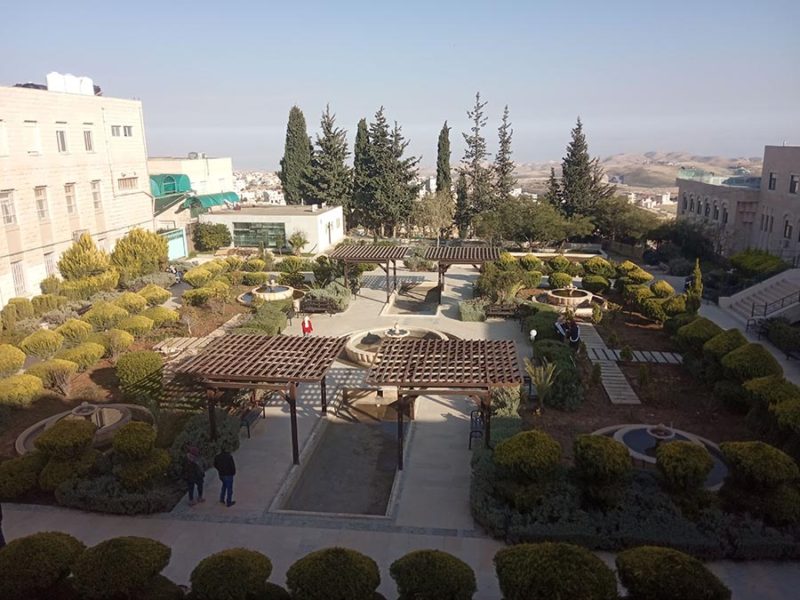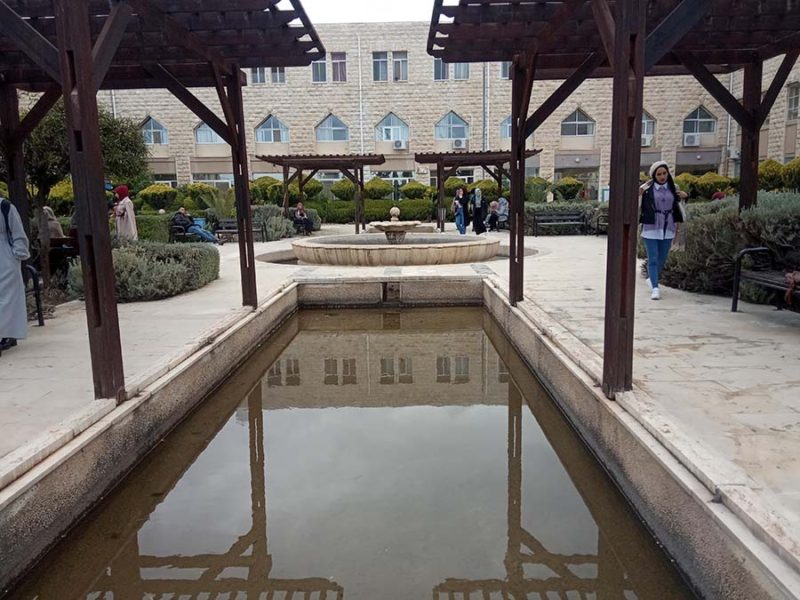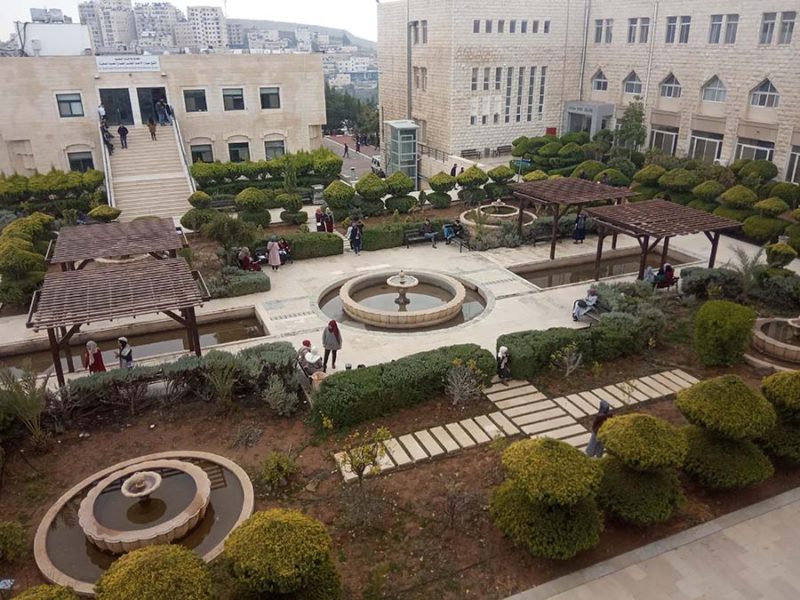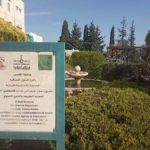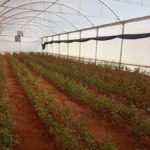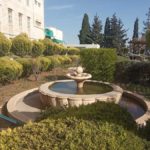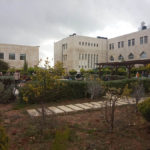Last Monday January 13th, we participated in a courtesy visit to Al Quds University Andalusian Botanical Garden. This space, located in the middle of the University’s main campus, was built by FUNCI in collaboration with the Spanish Agency for International Development Cooperation (AECID) in 2009, as part of the Med-O-Med project launched by FUNCI that same year.
This spot attempts to evoke the ancient gardens erected in the Iberian Peninsula many centuries ago. Its particular spatial distribution makes of it a unique space where to conserve Mediterranean Flora. Furthermore, as part of its conservation aims, its particular beauty creates the perfect atmosphere for gathering and leisure activities. Since its creation, this Garden has become an integral and indisputable part of the University’s Campus life, being daily used by students and staff.
This Andalusian Garden is part of a wider strategy developed by Al Quds University’s Science and Technology Faculty. Bearing in mind the challenges (climate change, settlement policy, etc.) that the Palestinian Flora is facing, several local and national institutions, leaded by Al Quds University, are developing an integral framework aimed at protecting and propagating their endemic botanical species. At the same time, this struggle for the preservation of nature is linked with the maintenance of the Palestinian people’s identity and culture.
During our visit, we had the opportunity of interviewing the person in charge of Al Quds University Botanical project, Doctor Khalid Sawalha. Thus, in the following lines, we will be talking about the development, aims, implications and achievements of the Andalusian Garden, the challenges that Palestinian Flora is facing, and the ECOPAL innovative initiative they are currently promoting.
What is the Andalusian Botanical Garden Project?
Prof. Sawalha: The Andalusian Botanical Garden was established in 2009 at Al Quds University. It was a great job done in collaboration with the MEDOMED network, from the Islamic Culture Foundation. Since then, it has been in constant development and under maintenance. Nowadays it is used efficiently by our students, and enjoyed by the public and guests who visited the university. Furthermore, we conceive it as a greatly important site for the natural and national character of the Palestinian people.
This project has been part of the Al Quds University Botanical Gardens framework; whose main idea is to conserve the natural Palestinian flora. There, we introduced more than 20 native species of Palestinian plants, in order to develop conservation, classification and scientific research tasks. Since that time until almost today, we have managed it efficiently. But we need to work more deeply in the classification and taxonomy fields. In order to achieve it, we hope to tighten our collaboration with FUNCI and other Spanish Universities and institutions.
Have there been any evolution regarding the treated species in the Botanical Garden, since its establishment?
Regarding its evolution, the plants are growing and the garden is getting more mature and developed. Then, this has prompted further research and has allowed us to look at wider botanical aspects. Furthermore, we are working in introducing new plants.
A part of it, I would like to outline, how since its creation, the Garden has been used for other important purposes, such as graduation or national celebrations, gatherings and festivities.
The Andalusian Botanical Garden was established in 2009 at Al Quds University. It was a great job done in collaboration with the MEDOMED network, from the Islamic Culture Foundation.
Regarding all the different challenges that the Palestinian Flora is suffering. How does this garden help to protect Palestinian endangered species?
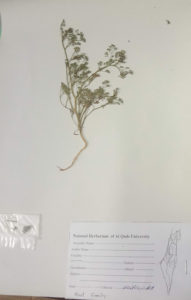 The garden itself is a milestone and unique distinctive step in Palestine to contribute for conservation of nature, and plays an important role in the complex framework created for protecting our endemic Flora. This process consists, firstly, in gathering all the different specimens we can discern. Secondly, we carry out an identification process, classify them, and store them in the herbarium or seedbank in order to conserve them. Finally, in order to ensure their endurance, we carry out propagation activities, by growing living plants in the different gardens we have. It is important to grow these living plants in closed and monitored spaces for its own sensitive protection and maintenance. Therefore, gardens, together with certain specific institutions, are the perfect spaces where we conserve the most sensitive and endangered plants species, at herbs level or even trees.
The garden itself is a milestone and unique distinctive step in Palestine to contribute for conservation of nature, and plays an important role in the complex framework created for protecting our endemic Flora. This process consists, firstly, in gathering all the different specimens we can discern. Secondly, we carry out an identification process, classify them, and store them in the herbarium or seedbank in order to conserve them. Finally, in order to ensure their endurance, we carry out propagation activities, by growing living plants in the different gardens we have. It is important to grow these living plants in closed and monitored spaces for its own sensitive protection and maintenance. Therefore, gardens, together with certain specific institutions, are the perfect spaces where we conserve the most sensitive and endangered plants species, at herbs level or even trees.
The Andalusian Garden of Al Quds is one perfect model and example of what we have been mentioning. As I said before, we have introduced here more than 20 different species, some of whom we can be proud of, such as the Pistacia Vera and Ziziphus Cristi. These last ones are native to Palestine and they are now growing from small plants to large trees, evidencing that the work being done here is successful. However, we don’t have to get too confident, and more efforts for propagation and production of this spaces must be done. With it, we also need to underline that, despite having great experts here in seeds dissemination, we lack of taxonomy specialists.
The garden itself is a milestone and unique distinctive step in Palestine to contribute for conservation of nature, and plays an important role in the complex framework created for protecting our endemic Flora.
Which specific aspects of the Andalusian Botanical Gardens can you consider to be ideal for the preservation of this species?
Definitely the Andalusian Botanical Gardens are ideal and perfect models for the conservation of nature. What we witnessed at the Alhambra Gardens, or in the region of Andalusia caught our attention. Specially the water canal system connection and how they were efficiently used for irrigation. We did the same here in Al Quds University. The water we spread out through the canals and the fountains is not spoiled, but properly reused by watering the plants. So, taking into account the current and severe lack of hydric resources here in Palestine, this pipe framework is perfect for growing our endangered plants with a competent and dynamic technique.
Even though there are some Palestinian endemic plants, do you think there is a relation or common pattern among the Mediterranean flora?
Within the Mediterranean region and throughout its coasts there are a lot of climate similarities. This has prompted the growing of similar flora, such as citrus, olives, palm dates, many herbs or medicinal plants. So the Mediterranean neighbours, we share lots of common species. Taking into account this reality, together with the existing regional and national agencies, we believe that more cooperation can be enforced in this field. In a way, the deficits of each institution can be mended by relying on the strengths of the others. And currently we are facing a lot of challenges.
Talking about challenges, in 2015, the Israeli army attacked the University. How has it recovered? And did the attack affect the Garden?
It was horrible experience. Five years ago, the Israeli army attacked the campus, entered the faculty of science and technology with guns and fired tear gases to students and the garden. They destroyed the pots from the Andalusian Garden, and the glasses leading to it. Unfortunately, the aggressive attacks by Israeli army are repeated frequently since the AQU is facing the separation wall in front of the main campus in Abu Dis.
The University officially protested against this raid. But at the end, we recovered our installations from the attack and reported to FUNCI this aggression.
When talking about Med-O-Med projects, in Med-O-Med we believe that there is a strong link between environment and culture. Therefore, the preservation of the former can help to the maintenance of the last one. What do you think, taking into account the current situation of the Palestinian culture and identity?
The system of Gardens that we have in Al Quds University, which includes the Andalusian one, are a perfect approach for the conservation of Palestinian flora, but at the same time a way to maintain our natural essence as a treasure of national identity.
Here in Palestine, we are facing large challenges regarding the Israeli occupation, especially, confiscation of land and settlements which are based on our towns’ demolition. It is a fight for each meter square and we would like to conserve our nation. Therefore, in order to fight this issue from our Natural Sciences’ field, in 2016 we launched the ECOPAL initiative. The initiative convenes several Palestinian Universities and Wildlife protection associations, in order to defend our ecosystems and natural reserves, as a strategy to maintain and extol our national environmental heritage. This is done by strengthening academic cooperation for expanding protection areas, widening conservation programmes, identifying the species present in our whole territory, and fostering its propagation. Furthermore, in these tasks ECOPAL involves local organisations and their universities students, in order to raise awareness about the need to protect the environment and its particularities.
The system of Gardens that we have in Al Quds University, which includes the Andalusian one, are a perfect approach for the conservation of Palestinian flora, but at the same time a way to maintain our natural essence as a treasure of national identity.
At the same time, we believe that natural environment its part of ones’ own culture. It is also important to remember how there are common patterns among Mediterranean societies. Hence, we hope more cooperation can be achieved between our network and other regional institutions, in order to improve our techniques, methods and knowledge. Meanwhile, it would be desirable to claim the proximity between our cultures and their past connections, in an attempt to reduce current tensions and divisions. For instance, here, the Dome of the Rock of Haram-e Shariff (Al-Aqsa Compound) has similar style to Alhambra Palace’s Dome, because both were built under the same rulers, the Umayyad Khalifs.
Antoni Sastre Bel – FUNCI
This post is available in: English Español

